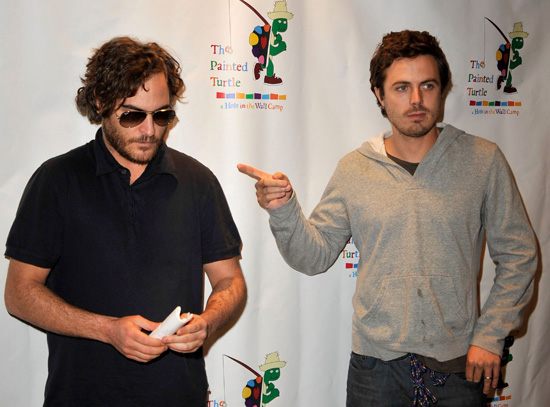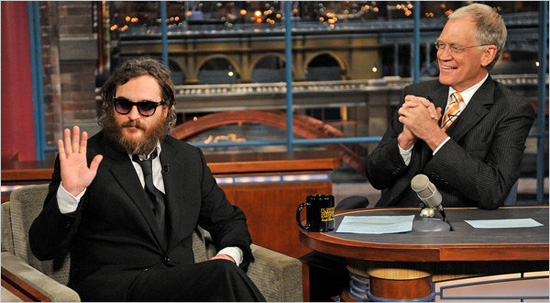
We knew something was off about Joaquin Phoenix‘s so-called “rap career.” And guess what? Turns out it was all FAKE!
The actor’s new documentary “I’m Still Here” supposedly chronicles Phoenix as he transitions from the world of Hollywood to the world of Hip-Hop, however the film’s director Casey Affleck basically says that it was all a “performance” on Joaquin’s part.
So does this mean that Joaquin Phoenix growing a beard and acting all weird and creepy on David Letterman last year (among other random appearances) was just a big joke between himself and Casey Affleck? Apparently so!
Continue reading for the details…

“It’s a terrific performance, it’s the performance of his career,” Casey Affleck told the New York Times. He was speaking of Mr. Phoenix’s two-year portrayal of himself — on screen and off — as a bearded, drug-addled aspiring rap star, who, as Mr. Affleck tells it, put his professional life on the line to star in a bit of “gonzo filmmaking” modeled on the reality-bending journalism of Hunter S. Thompson. “I’m Still Here” was released last week by Magnolia Pictures to scathing reviews by a number of critics, including Roger Ebert, who wrote that the film was “a sad and painful documentary that serves little useful purpose other than to pound another nail into the coffin.”
“The reviews were so angry,” said Mr. Affleck, who attributed much of the hostility to his own long silence about a film that left more than a few viewers wondering what was real — The drugs? The hookers? The childhood home-movie sequences in the beginning? — and what was not. Virtually none of it was real. Not even the opening shots, supposedly of Mr. Phoenix and his siblings swimming in a water hole in Panama. That, Mr. Affleck said, was actually shot in Hawaii with actors, then run back and forth on top of an old videocassette recording of “Paris, Texas” to degrade the images. “I never intended to trick anybody,” said Mr. Affleck, an intense 35-year-old who spoke over a meat-free, cheese-free vegetable sandwich on Thursday. “The idea of a quote, hoax, unquote, never entered my mind.”
Still, he acknowledged that Mr. Letterman was not in on the joke when Mr. Phoenix, on Feb. 11, 2009, seemed to implode his own career by showing up in character as a mumbling, aimless star gone wrong. Mr. Letterman summed up the interview: “Joaquin, I’m sorry you couldn’t be here tonight.”
Asked whether Mr. Phoenix would be in character for his return to Mr. Letterman’s program on Wednesday, Mr. Affleck said, “No, no, no.” And Mr. Letterman has not talked with Mr. Phoenix about the coming appearance, he added. Most mockumentaries, in the way of “This Is Spinal Tap,” wear their foolishness on their sleeves, leaving no doubt about their character as fiction. But Mr. Affleck, who is married to Mr. Phoenix’s sister and has been his friend for almost 20 years, said he wanted audiences to experience the film’s narrative, about the disintegration of celebrity, without the clutter of preconceived notions.
So he said little in interviews. “We wanted to create a space,” he said. “You believe what’s happening is real.”
As the film progresses, Mr. Affleck explained, subtle cues were supposed to provide hints of his real intention. Camera techniques, extremely raw at the beginning, become more sophisticated as the film goes on, for instance.
“There were multiple takes, these are performances,” Mr. Affleck said of unsettling sequences in which Mr. Phoenix appears to snort drugs, consort with hookers, and hunt to the ground an assistant who has betrayed him to the press — again, mostly actors.
But the movie never quite showed its hand. “There was no wink,” Mr. Affleck said.
One of the trickier elements was to win the cooperation of Mr. Phoenix’s agent, Patrick Whitesell, of William Morris Endeavor Entertainment. On telling Mr. Whitesell that he planned to make everybody believe that a prized client “has lost his mind and make him as unattractive as possible, you would think he would have me killed immediately,” Mr. Affleck said.
But Mr. Whitesell, instead, took a part in the film.
Mr. Phoenix’s unconventional background may have helped convince some that the film was true. Now 35, he was one of five children in a free-spirited family that bounced from life in a religious cult through a time when the siblings worked as street performers. Mr. Phoenix’s brother River, also an actor, died of a drug overdose in 1993. His sister Summer eventually married Mr. Affleck.
In the film Mr. Phoenix is often called “J. P.,” both an attempt at a rap stage name and the inevitable shorthand of a star’s inner world. At one point in the film Mr. Phoenix howls at his crew in exasperation: “J. P. is all of us.”
As Mr. Affleck now makes clear, he is actually none of us — which is something of a relief.
But Mr. Phoenix may now have his work cut out for him when it comes to repairing an image that was marred by what Mr. Affleck portrays as his best performance. The Los Angeles Times reported this week that Mr. Phoenix, who makes much of abandoning his screen career in the film, is fielding offers for new roles.
Mr. Affleck, for his part, will return to acting for a while, probably in a film for Andrew Dominik, who directed “The Assassination of Jesse James by the Coward Robert Ford,” for which Mr. Affleck received an Oscar nomination.
At least one element in the film was genuine, Mr. Affleck said. That was a snippet of a home movie that showed Mr. Phoenix and his very young siblings performing, Jackson Five style, on the streets of Los Angeles. The rest, Mr. Affleck said, clearly requires a bit more understanding than he has allowed the viewers to date. “It is a hard movie to watch,” he said.
Well damn… we feel so hoodwinked and bamboozled right about now!! They really had us fooled. We had a feeling home boy was going crazy or losing it or something, but we didn’t think he was doing this as a sort of “acting experiment” just to see how good of an actor he is. We give him that much though!!







